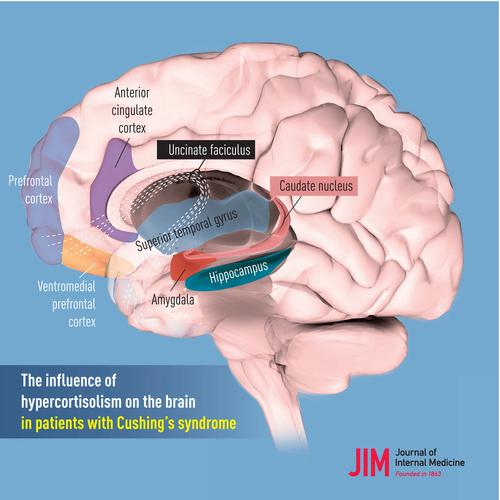当前位置:
X-MOL 学术
›
J. Intern. Med.
›
论文详情
Our official English website, www.x-mol.net, welcomes your feedback! (Note: you will need to create a separate account there.)
Psychiatric and neurocognitive consequences of endogenous hypercortisolism.
Journal of Internal Medicine ( IF 11.1 ) Pub Date : 2020-03-17 , DOI: 10.1111/joim.13056 M Piasecka 1, 2 , E Papakokkinou 1, 2 , E Valassi 3, 4 , A Santos 3, 4 , S M Webb 3, 4 , F de Vries 5 , A M Pereira 5 , O Ragnarsson 1, 2
Journal of Internal Medicine ( IF 11.1 ) Pub Date : 2020-03-17 , DOI: 10.1111/joim.13056 M Piasecka 1, 2 , E Papakokkinou 1, 2 , E Valassi 3, 4 , A Santos 3, 4 , S M Webb 3, 4 , F de Vries 5 , A M Pereira 5 , O Ragnarsson 1, 2
Affiliation

|
Psychiatric and neurocognitive symptoms due to hypercortisolism were already described by Harvey Cushing in his original paper on patients with Cushing’s syndrome (CS). Nowadays, it is well known that psychiatric and cognitive complaints are two of the most common, and most distressing, symptoms in patients with CS. Psychiatric symptoms are indeed a major clinical manifestation of CS. The most commonly observed psychiatric conditions are depression and anxiety, whilst mania and psychosis are less common. Several domains of cognitive function are impaired at diagnosis, including episodic and working memory, executive function and attention. Following treatment, one‐fourth of the patients still experience depressed mood, and the cognitive impairments are only partially restored. Consequently, quality of life in patients with CS is severely and persistently affected. Neuroimaging studies have also illustrated the deleterious effects of hypercortisolism on the brain by demonstrating reduced grey matter volumes and cortical thickness, altered resting‐state functional responses and during cognitive tasks, as well as widespread reduced white matter integrity, especially in structures important for cognitive function and emotional processing, both before and after successful abrogation of hypercortisolism. In this paper, we summarize the current knowledge on the psychiatric and neurocognitive consequences of hypercortisolism in patients with CS, both before, and after successful treatment. In addition, we review the structural and functional brain abnormalities associated with hypercortisolism and discuss the influence of these factors on quality of life.
中文翻译:

内源性皮质醇过多症的精神病学和神经认知后果。
哈维·库欣(Harvey Cushing)在有关库欣综合征(CS)患者的原始论文中已经描述了由于皮质醇过多症引起的精神病和神经认知症状。如今,众所周知,精神病和认知障碍是CS患者中最常见,最令人困扰的两种症状。精神症状确实是CS的主要临床表现。最常见的精神病是抑郁和焦虑,而躁狂和精神病则较不常见。诊断过程中认知功能的几个领域受到损害,包括情节和工作记忆,执行功能和注意力。治疗后,仍有四分之一的患者情绪低落,认知障碍仅能部分恢复。所以,CS患者的生活质量受到严重和持续的影响。神经影像学研究还通过显示减少的灰质体积和皮质厚度,改变的静止状态功能反应和认知任务以及广泛减少的白质完整性,特别是在对认知功能重要的结构中,说明了皮质醇过多症对大脑的有害影响。和消退的过程,包括成功取消皮质醇过多症之前和之后。在本文中,我们总结了有关成功治疗前后CS患者高皮质醇血症的精神和神经认知后果的最新知识。此外,
更新日期:2020-03-17
中文翻译:

内源性皮质醇过多症的精神病学和神经认知后果。
哈维·库欣(Harvey Cushing)在有关库欣综合征(CS)患者的原始论文中已经描述了由于皮质醇过多症引起的精神病和神经认知症状。如今,众所周知,精神病和认知障碍是CS患者中最常见,最令人困扰的两种症状。精神症状确实是CS的主要临床表现。最常见的精神病是抑郁和焦虑,而躁狂和精神病则较不常见。诊断过程中认知功能的几个领域受到损害,包括情节和工作记忆,执行功能和注意力。治疗后,仍有四分之一的患者情绪低落,认知障碍仅能部分恢复。所以,CS患者的生活质量受到严重和持续的影响。神经影像学研究还通过显示减少的灰质体积和皮质厚度,改变的静止状态功能反应和认知任务以及广泛减少的白质完整性,特别是在对认知功能重要的结构中,说明了皮质醇过多症对大脑的有害影响。和消退的过程,包括成功取消皮质醇过多症之前和之后。在本文中,我们总结了有关成功治疗前后CS患者高皮质醇血症的精神和神经认知后果的最新知识。此外,


























 京公网安备 11010802027423号
京公网安备 11010802027423号